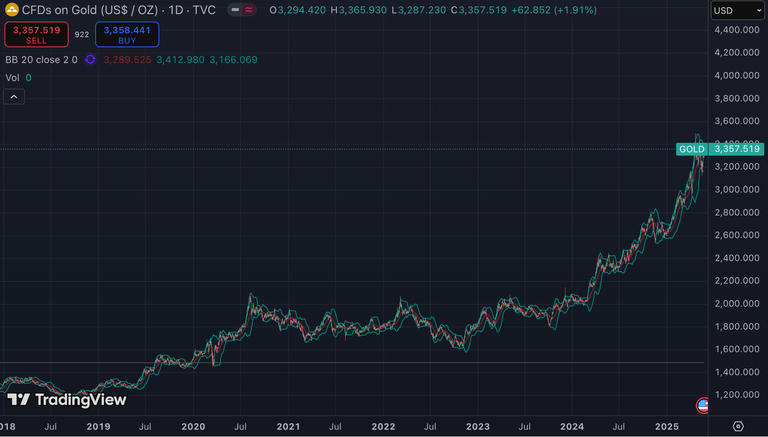Gold, Bitcoin, and the quiet shift in what the world trusts
There’s been a quiet but important shift happening in the background of global finance. While headlines focus on inflation and elections, central banks are stocking up on gold, and big-money investors are pouring into Bitcoin. These two assets—one ancient, one digital—are getting a lot of attention for one reason: people are starting to question the future of fiat money.
Let’s start with the U.S. debt situation. The government recently auctioned off $16 billion in 20-year bonds, and the only way it could get enough buyers was by offering over 5% interest see. That’s a pretty strong signal that confidence is slipping. The national debt has already passed $36 trillion, and with interest payments piling up, it’s becoming harder to pretend everything’s fine. Foreign buyers like China and Japan have quietly stepped back. In their place, the Federal Reserve is buying more U.S. debt, essentially printing money to keep the machine running.

At the same time, gold is making a big comeback. The U.S. still holds more gold than any other country, over 8,100 tonnes, but funnily enough, it’s still officially valued on paper at $42 per ounce—a price from the 1930s. In reality, gold is trading around $3,000 these days. Central banks, especially China’s, have been buying more of it every month. They’re not doing that because they think gold looks pretty. They’re doing it because it’s stable, neutral, and doesn’t rely on anyone else’s promise. In a world of rising debt and declining trust, gold feels safe.

But there’s also Bitcoin. It’s not backed by governments or gold bars, but it is backed by code—and a hard cap of 21 million coins. Since the U.S. approved spot Bitcoin ETFs last year, institutional investors have been jumping in. Those ETFs now hold over 800,000 Bitcoin, and it’s becoming clear that Bitcoin isn’t just a speculative bet anymore. It’s becoming a serious option for people who want something outside the traditional system. Sure, it’s volatile, but it’s portable, decentralized, and doesn’t care who’s in office or how much debt a country has.
What’s fascinating is that both gold and Bitcoin are gaining traction at the same time. They’re not competing; they’re doing different jobs. Gold is for those who want something time-tested and reliable. Bitcoin is for those who want something independent, digital, and forward-looking. They’re both responses to the same problem: a growing sense that the current system—built on endless debt and printed money—might not be as solid as it once seemed.
So while the headlines are busy elsewhere, gold and Bitcoin are quietly stepping in. Not as replacements for money (at least not yet), but as signals. People are asking: if things go sideways, where would I rather be?
And increasingly, the answer isn’t dollars or euros. It’s something scarcer—and harder to manipulate.
Posted Using INLEO
This is absolutely true. If we look at it, the thing that has given the most profit to people in the last 10 years is Bitcoin. Those who bought it in 2008 have become rich today. They just had to be patient.
Indeed, the growing interest of central banks in gold and the increasing flow of investors into Bitcoin show a rising doubt about the stability of traditional currencies.
https://x.com/lee19389/status/1926742029251366998
#hive #posh
I am so confident that in years to come the use of gold will still grow much more and it will get better. The future is definitely bright for the financial system